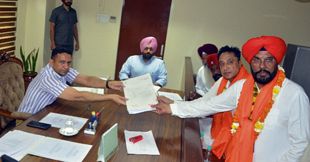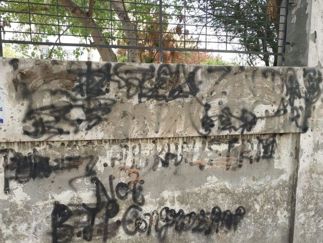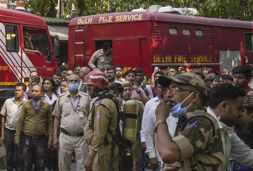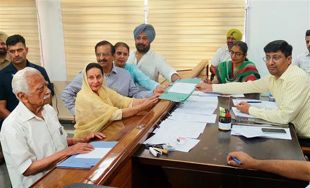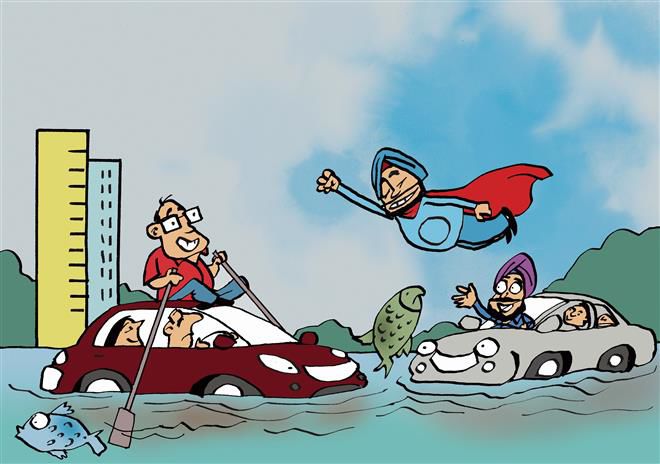
Monsoon brings with it the problem of waterlogging resulting in severe hardships for people and calls for planned solutions. Illustration: Sandeep Joshi
Clear garbage dumps to check waterlogging
Amritsar city has been facing the problem of waterlogging during the monsoon season since Independence. Until and unless the MC authorities take stern action to eradicate the problem forever, all its claims regarding monsoon preparedness may prove to be hollow. The root cause for several roads and localities getting inundated with only a few hours of rain is lack of effective drainage system in the city. So, the foremost step that the MC authorities should take on priority basis is to awaken from its deep slumber as even after the passage of so many decades, the problem is lingering on. It should take concrete steps to build a new effective drainage system across the city in such a manner that waterlogging is prevented. Secondly, roads should be cleared of ditches and potholes. Last but not the least, all areas of our city need to be cleared of huge dumps of garbage lying on roads, especially plastic items, polythene bags etc which are a major source of blockage whenever there is rain in city.
Sanjay Chawla
Carry out de-silting in water channels
Extreme weather events cannot be predicted with precision for they can strike anywhere, anytime with the severity and ferocity recently witnessed in Dubai. Such natural disasters apart, routine preparations against the regular, seasonal rains help manage the surface overflow of rainwater fairly well, notwithstanding the inevitable inundation of low-lying areas. We cannot change the natural level of the walled city which was founded on a low lying ‘Dhaab’. In fact, it has been a practice in the countryside to provide a fresh layer of mud on thatched roofs during May-June, as a preparation to withstand the rains. Seen in this context, huge heaps of garbage and plastic bags lying here and there and everywhere pose a real challenge, because heavy and incessant rain will float them into sewer lines and create a Dubai-like situation which will be of our own making. As such, the Herculean task of de-silting all such channels, including the section of the Upper Bari Doab Canal, particularly the part near the three bridges, should be taken up on a war footing. Residents, on their part, should minimise the use of thin plastic bags and help in their proper disposal. Incidentally, there is no Municipal Corporation as of yet and the administration is free from vested interests. A stitch in time saves nine!
Prof Mohan Singh
Residents should shoulder responsibility
Monsoon season is approaching and there are chances of waterlogging and flooding in city areas. So, the municipal corporations and urban development authorities should prepare accordingly to prevent waterlogging. All sewerage connections should be properly audited and clogging checked prior to the onset of the monsoon. Debris lying near drainage lines should be cleaned. Above all, it is the residents of colonies who need to be careful and watchful, as government departments don’t have sufficient manpower to cover large areas. Residents should not escape from their responsibilities and blame only government machinery for the waterlogging.
Harvinder Singh Chugh
Ensure cleaning of litter, drains
Before the arrival of monsoon, the municipal corporation should check and clean the sewerage system so that accumulation of soil can be prevented. Apart from this, roads should be cleaned of stone and litter that restrict the flow of water from entering the sewer. Also, the authorities should install pumps that draw out the accumulated water through downspout. Construct the catchment area that stored the rainwater which would further be used for household purposes. A dry well is another method to prevent waterlogging. The MC ensures construction of dry wells in areas where this problem creates severe disasters for residents.
Bharti Thakur
Follow best practices from other cities
Waterlogging has become a common and critical issue in urban areas, especially during heavy rainfall. It can lead to flooding of streets and low-lying areas, causing inconvenience, damage and sometimes even loss of life. To address the problem, the Municipal Corporation (MC) can take various measures. First, the MC should assess the existing drainage system including the condition of storm water drains, culverts and other infrastructure designed for carrying rainwater. Their regular maintenance and cleaning are essential. Secondly, the MC should ensure proper urban planning by considering factors like land elevation, slope and natural drainage patterns while designing new areas. For this, it should implement green infrastructure such as permeable pavements, green roofs and rain gardens to absorb excess water. It should encourage harvesting of rainwater by providing incentives or implementing regulations. Additionally, the MC should identify flood-prone areas based on historical data and topography and implement flood-zoning regulations to restrict construction in vulnerable zones. It should also take preventive measures, such as clearing drains and ensuring the proper functioning of pumps in case of forecasts for heavy rainfall. Emergency response plans including evacuation routes, shelters and coordination with other agencies should be kept ready. The MC should create awareness among the residents to report drainage issues promptly, about responsible waste disposal, and emergency procedures. Investment in modern drainage infrastructure, including large storm water drains, retention ponds, flood barriers and innovative solutions is indispensable. The MC should promote natural water absorption techniques like the use of green spaces, parks and wetlands to absorb excess water by avoiding excessive concretisation. Besides, the MC should collaborate with hydrologists, urban planners and environmental experts to develop effective strategies and implement best practices from other cities facing similar challenges.
Dr Kulwant Singh Phull
Encroachments create problems
Waterlogging is a common problem in almost all cities of India. The condition becomes worse every year during the rainy season when the city’s infrastructure starts crumbling in many ways. The roads and streets are broken and big potholes appear soon after laying as the quality of construction is severely compromised by the contractors in connivance with the officials of Public Works Department (PWD). Likewise, the water disposal channels too are neither properly laid nor timely repaired, which get clogged even after mild rainfall. The recent downpour exposed the tall claims of the Municipal Corporation in Jalandhar regarding monsoon preparedness as several roads and localities are still waterlogged even as the monsoon is yet to arrive. Resultantly, traffic snarls at various places caused by unorganised development and broken roads are a routine experience, besides numerous other hardships to commuters and physical risk to life and property. More so, the stagnant water and garbage squandered here and there creates environmental issues and a flurry of viral diseases. To check the problem of water-logging, the authorities need to act proactively before the advent of rainy season by ensuring that drainage outlets are in good shape and properly reinforced. While all sorts of haphazard and unauthorised urbanisation have to be curbed, the government must tackle the problem of illegal encroachments on lands marked for water bodies. All ongoing construction works ought to be completed well before the arrival of monsoon, instead of trying to cover up the delay through various excuses like incessant rains, deluge, blockade of disposal channels etc. As a solution to the problem of quality, construction contracts can invariably be substituted with suitable maintenance clause, while the supervising officials putting all the blame on vagaries of nature should be taken to task for any dereliction of duties, whatsoever. Since the rainy season is still a few months away, utmost attention to the development of city infrastructure involving proactive steps for maintenance of all drainage outlets and sewers must be undertaken to avoid inconvenience to the public.
Nirmaljit Singh Chatrath
Lay French drains with grid system
Monsoon brings succour along with drastic changes and disruption in human lives. Waterlogging and damage to crops, among others, are the common adversities faced by residents. Waterlogging poses a serious damage to roads and commuters, resulting in traffic disruption, and hence, accidents. To control waterlogging, crucial steps should be implemented. First, a proper drainage system should be established alongside roads, underground drainage grids or French drains should be laid as it could greatly reduce the problem of waterlogging. This way, it reduces the risk of property/infrastructure damage and potential health hazards caused by flooding. To manage storm water and lessen effects of heavy rains on the environment, adding green infrastructure like permeable pavement through which water seeps down to the water bed is a great way out. Waterlogging of soil brings down oxygen level in soil, reducing plant growth and eventually leading to death of the plant. For prevention of waterlogging and soil erosion, rainwater harvesting should be promoted. It has been proved that it improves the quality and quantity of groundwater and decreases the demand for water.
Kritika Arora
Hold municipal body officials accountable
Every time there is continuous rain, even a moderate spell for half an hour, roads and streets in the city are inundated. This happens mainly because of defective, inadequate and incomplete storm water sewer channels. Most distressing is the fact that these sewer lines are not properly and thoroughly de-silted at least even once a year, especially before the onset of monsoon. Although it is claimed that the same is regularly done, yet every authority concerned knows that this is only a false exercise and no action is taken against the corrupt officials. This is still the biggest grey area where rampant corruption and criminal negligence is totally ignored without any justification. However, to prevent waterlogging, the campaign of getting all storm water channels thoroughly cleaned should be carried out under the supervision of MC Commissioner himself. Besides, the damaged channels need to be repaired and connected with main pipes. But this is only a temporary and half-baked measure. To get rid of this menace permanently, the existing storm water sewerage layout must be reviewed at the highest level to replace it with complete, efficient and self-sustaining mechanism. The officials responsible for its regular cleanliness and maintenance must be held accountable in case the problem still persists in normal circumstances.
Jagdish Chander
Harvest rainwater, involve communities
Waterlogging is a major issue that causes a great deal of trouble every year in India, particularly during the monsoon season. Heavy rainfall often leads to flooding, which can be a nightmare for people living in households near drainage systems or gutters. The problem is further exacerbated by the fact that the Indian government often fails to adequately prepare for such situations, leading to insufficient measures, As a result, people are left to deal with the consequences of waterlogging, which can include damage to property, disruption of transportation and increased health risks due to the spread of water-borne diseases. Despite the government’s efforts to address the issue, more needs to be done to ensure that communities are better equipped to manage the effects of heavy rainfall and reduce the risk of waterlogging in the future. For this, a certain number of ways can be adapted by the government. One of the key steps to prevent waterlogging in the city is to devise a clear and comprehensive drainage clearing system that operates on a monthly basis. This system should ensure that the gutters are thoroughly cleaned throughout the year to enable the free flow of water and prevent any type of blockage in the sewer, especially by polythene. In addition, the administration can take measures such as building rainwater harvesting centres and wells near areas that are prone to heavy rainfall. This will help to reduce the volume of water that enters the drainage system and prevent it from getting overwhelmed. The installation of additional drainage pipes can also be considered to further reduce the risk of excessive water entering the system during periods of heavy rainfall. By implementing these measures, the city can effectively prevent waterlogging and ensure that its residents enjoy a safe and comfortable living environment.
Lakshit Jindal
Keep the cleaning machines always active
The problem of waterlogging is not new in the cities. For the past four decades, the municipal corporations in Punjab have been trying to frame estimates on how to tackle the menace of waterlogging during the monsoon season. Funds were released and exhausted but the condition of waterlogging remained the same. Laying of storm water sewers was the demand of people residing in cities that had a Municipal Corporation. The old sewerage pipes have become small to clear the rainwater. Thus, the problem remains the same. The Municipal Corporation should move ahead with cleaning of sewerage chambers, the inner lines with machines, regularly round the year. The cleaning of sewer lines and sewer chambers by removing the slush can prove to be a fast remedy from waterlogging during the monsoon season. Apart from this, the Municipal Corporation has constructed road gullies and laid pipes for flow of rainwater. Similarly, the slush/mud should be removed from road gullies so that the water can flow without any hindrance in these special pipelines constructed for the movement of rainwater. At present, the Municipal Corporation has big vacuum cleaning machines to clear the slush from sewer lines. These machines should be kept active throughout the year, from downstream to upstream.
Rajat Kumar Mohindru
QUESTION FOR NEXT WEEK
The green cover is shrinking and the environment is getting polluted rapidly day by day. Rising water and air pollution is a danger to the health of the public. What drastic steps should the administration and the public together take to check this environmental degradation?
Suggestions in not more than 200 words can be sent to [email protected] by Thursday (May 2)
Join Whatsapp Channel of The Tribune for latest updates.





















